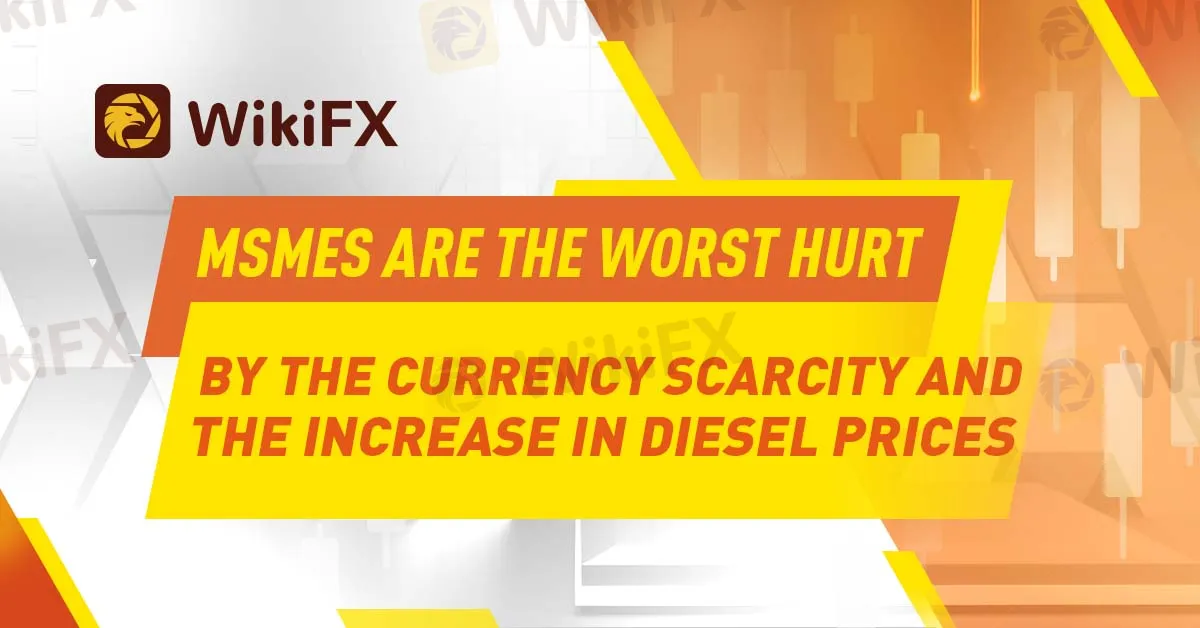简体中文
繁體中文
English
Pусский
日本語
ภาษาไทย
Tiếng Việt
Bahasa Indonesia
Español
हिन्दी
Filippiiniläinen
Français
Deutsch
Português
Türkçe
한국어
العربية
MSMES ARE THE WORST HURT BY THE CURRENCY SCARCITY AND THE INCREASE IN DIESEL PRICES
Abstract:According to Dr. Femi Egbesola, National President of the Association of Small Business Owners of Nigeria, the country's micro, small, and medium firms are being impacted the hardest by the present dollar scarcity and high diesel costs.

According to Dr. Femi Egbesola, National President of the Association of Small Business Owners of Nigeria, the country's micro, small, and medium firms are being impacted the hardest by the present dollar scarcity and high diesel costs.
While the Central Bank of Nigeria made it simpler for major enterprises to get dollars from commercial banks, he claims that MSMEs frequently struggle and are forced to rely on the parallel market.
The country has been suffering from a serious dollar shortage, which has been compounded by the instability often associated with elections and indirect primaries, when politicians scavenge cash from the black market and commercial institutions.
According to statistics on the CBN's website as of Friday, the official rate remained at N415.87 per dollar, but as of Thursday evening, a dollar swapped for between N600 and N610 in the parallel market.
Despite analysts' worries that the arbitrage was unsustainable and fostered corruption, the naira has continued to depreciate in the parallel market versus the dollar, while the Importers and Exporters window rate has stayed relatively steady.
“Micro and small enterprises are the worst hurt by the dollar shortage and high cost of diesel,” Egbesola told our correspondent over the phone recently. We lack the financial resources available to medium and big firms to mitigate the damage.
“Because of how the CBN constructed it, medium and big enterprises find it simpler to receive dollars from banks, leaving us with little alternative except to rely on the illicit market for currency.” As a result, we have the highest prevalence. We know we're up against a huge obstacle when we compete in the same market with medium and large-scale firms that obtain it at a cheaper cost.
In response to the high cost of diesel, he claimed that due to production costs, many things imported into the country were cheaper than those created domestically. “That is why some of our members are closing their doors, not only ceasing production, but also seeking for alternate means of revenue,” he stated. Approximately 15 to 18% of our members have closed their doors or are facing financial problems. Because energy supply is unreliable and we can only buy limited amounts at a time, we rely increasingly on fuel. We cannot be compared to larger corporations that can purchase fuel tankers in bulk. They can acquire it cheaper and even on credit, with the opportunity to pay in installments or at a later date.
He asked the government to focus more on SMEs, which he described as the development engine.
“The government cannot generate employment; we must,” he said. So, how can we generate jobs when we can't even make a living, let alone a profit? Currently, manufacturing and small enterprises are shutting, resulting in employment losses. It isn't right.
“Some of our members are migrating to neighboring countries because their power and currencies are reliable, and their regulations favor small enterprises.”
According to a joint study issued in January by the National Bureau of Statistics and the Nigerian Small and Medium Enterprises Development Agency, Nigeria has 39,654,385 MSMEs as of December 2020, a decrease from 41,543,028 in 2017. They contributed 4.5 percent of the country's GDP, according to the report.
According to Egbesola, ASBON has over 23,000 members in 27 states across the country.
“The CBN and SMEDAN defined small companies as enterprises with operating capital, not assets, ranging from N5 million to N50 million, while N5 million and lower is deemed a micro-enterprise,” he went on to say.
“If you have 30 or less people, you're called a small firm; if you have more than 30, you're labeled a medium or large corporation.” So the two indexes are working capital and workers.

Disclaimer:
The views in this article only represent the author's personal views, and do not constitute investment advice on this platform. This platform does not guarantee the accuracy, completeness and timeliness of the information in the article, and will not be liable for any loss caused by the use of or reliance on the information in the article.
Read more

5 Steps to Empower Investors' Trading
Forex trading is a world full of opportunities and challenges, attracting investors from around the globe to participate.

How to Find the Perfect Broker for Your Trading Journey?
Choosing the right broker to open an account is a crucial first step in your investment journey. It not only impacts your trading costs but also significantly enhances your investment efficiency.

The Most Effective Technical Indicators for Forex Trading
Master Forex trading with the most effective technical indicators like RSI, MACD, and Bollinger Bands to spot trends and boost profits in 2025.

Decade-Long FX Scheme Unravels: Victims Lose Over RM48 Mil
A sophisticated forex investment scheme that took a decade to establish has been exposed as a global financial fraud. In Malaysia alone, at least 77 individuals have reportedly lost more than RM48 million.
WikiFX Broker
Latest News
Brazilian Man Charged in $290 Million Crypto Ponzi Scheme Affecting 126,000 Investors
Become a Full-Time FX Trader in 6 Simple Steps
ATFX Enhances Trading Platform with BlackArrow Integration
Decade-Long FX Scheme Unravels: Victims Lose Over RM48 Mil
The Top 5 Hidden Dangers of AI in Forex and Crypto Trading
How to Find the Perfect Broker for Your Trading Journey?
5 Steps to Empower Investors' Trading
The Most Effective Technical Indicators for Forex Trading
IG 2025 Most Comprehensive Review
SEC Drops Coinbase Lawsuit, Signals Crypto Policy Shift
Currency Calculator






